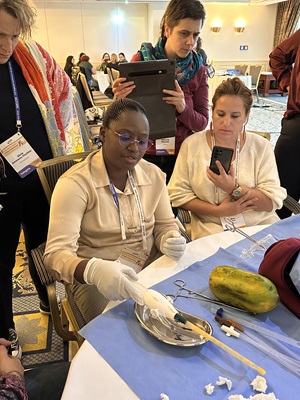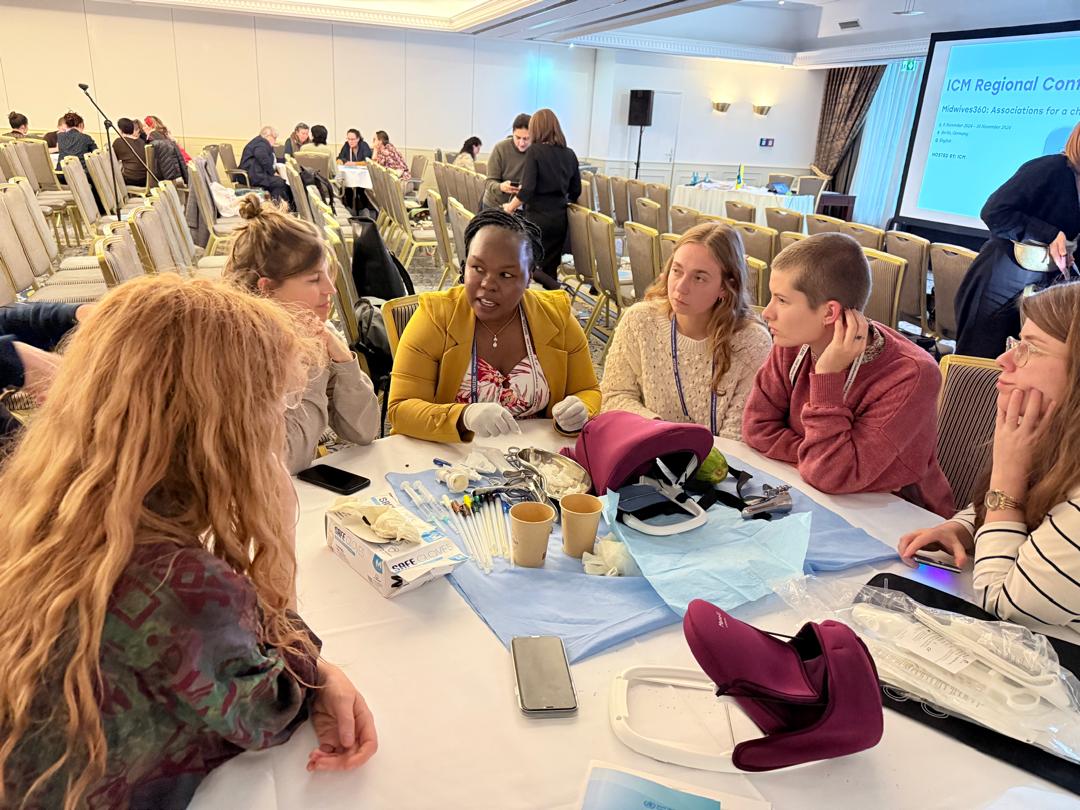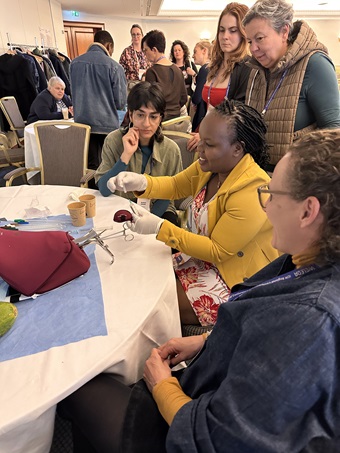Showing the power of global partnerships and collaboration, midwives from Rwanda shared their skills and knowledge of comprehensive abortion care as part of a new south-to-north learning approach initiated by the UN Special Programme in Human Reproduction (HRP) at an event organised by the International Confederation of Midwives in Berlin.
Comprehensive abortion care helps women make informed reproductive health decisions, while ensuring safe access to relevant medical and surgical procedures and quality aftercare. Given the leading role of midwives in supporting women’s health, strengthening their skills in this area is a critical step toward increasing access to safe abortion and improving health outcomes worldwide.
Training and cross-regional collaboration improves midwives’ knowledge and skills
 Rwandan midwives train European midwives in manual vacuum aspiration (MVA) using papayas as simulation models. ©ICM
Rwandan midwives train European midwives in manual vacuum aspiration (MVA) using papayas as simulation models. ©ICM
The two-day workshop engaged around 40 participants from 14 countries. During the event, two Rwandan midwives, Philomene Niragire and Seraphine Nyiraneza, focused on building skills in providing quality care for induced abortion and miscarriage, as well as for women and adolescent girls who experience complications after undergoing unsafe procedures.
“Sharing the skills that I have acquired during my 14 years as a midwife with colleagues from across the globe was truly an uplifting experience for me. I have a boost of motivation to continue learning on the topic as well as sharing my knowledge with other colleagues,” said Niragire.
In Rwanda, comprehensive abortion care training is an important part of the existing midwifery education programme. In-service trainings exist through national programmes as well as collaboration with other countries such as Ethiopia. However, this is not always the case in Europe, where the subject is often not included within midwives’ scope of practice and training opportunities may be limited.
This south-to-north knowledge exchange aimed to help bridge this gap, fostering cross-regional collaboration to build key skills while challenging traditional assumptions about the origin of medical expertise. The approach proved to be a powerful tool for enhancing European midwives’ knowledge on new practices, building technical expertise, and addressing shared challenges.
Skills gained during this workshop will be further disseminated by participants through their respective associations and countries.
“The training in Berlin offered evidence-based practices, practical approaches and strategies to overcome barriers in access to care,” said Viktoria Vivilaki from Greece, President of the European Midwives Association who participated in the training. "I was particularly inspired by the creative solutions and resilience demonstrated by colleagues working in diverse contexts.”

Rwandan midwives provide step-by-step guidance on manual vacuum aspiration (MVA), sharing their expertise to enhance practical skills and knowledge. ©ICM
Building trust and improving health through midwifery care
 Rwandan midwives train European midwives in manual vacuum aspiration (MVA), highlighting the power of cross-regional learning to improve women's health care. ©ICM
Rwandan midwives train European midwives in manual vacuum aspiration (MVA), highlighting the power of cross-regional learning to improve women's health care. ©ICM
Competent midwives are well positioned to provide a significant portion of sexual and reproductive health services, from contraception to abortion as well as care during pregnancy, childbirth and the postpartum period. However, despite their ability to provide such a broad range of care, midwives currently make up only about 10% of the global health workforce, according to WHO data. This stark gap highlights the critical need to train, support and empower midwives in countries around the world.
For Zab Franklin, midwife advisor at the International Confederation of Midwives (ICM) and an organizer of the south to north collaboration, the midwifery model of care – where midwives provide women with ongoing support – builds trust and enables women to more easily access different sexual and reproductive health services.
“It was great to be able to showcase our African midwifery colleagues' skills,” she said. “I believe we need to do more to promote contact between clinical midwives from the global north and south. There is a lot we can learn from each other about our experiences of working across all aspects of midwifery care.”
Following the success of this learning exchange, HRP is looking forward to implementing this model of learning across its activities. It will continue to foster meaningful learning opportunities, highlighting the skills and knowledge from practitioners across the globe, to improve outcomes for sexual and reproductive health and rights.
The work and impact described here has been funded by the Government of Canada through the UNDP-UNFPA-UNICEF-WHO-World Bank Special Programme of Research, Development and Research Training in Human Reproduction (HRP), a cosponsored programme executed by the World Health Organization (WHO).
